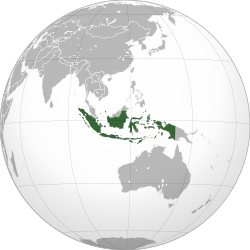Indonesia
6:18 AM
Posted by tourist guide
Indonesia, officially the Republic of Indonesia (Indonesian: Republik Indonesia), is a country in Southeast Asia and Oceania. Indonesia comprises 17,508 islands. With a population of around 230 million people, it is the world's fourth most populous country, and has the world's largest population of Muslims. Indonesia is a republic, with an elected legislature and president. The nation's capital city is Jakarta. The country shares land borders with Papua New Guinea, East Timor, and Malaysia. Other neighboring countries include Singapore, Philippines, Australia, and the Indian territory of the Andaman and Nicobar Islands. Indonesia is a founding member of ASEAN and a member of the G-20 major economies.
The Indonesian archipelago has been an important trade region since at least the seventh century, when Srivijaya and then later Majapahit traded with China and India. Local rulers gradually absorbed foreign cultural, religious and political models from the early centuries CE, and Hindu and Buddhist kingdoms flourished. Indonesian history has been influenced by foreign powers drawn to its natural resources. Muslim traders brought Islam, and European powers fought one another to monopolize trade in the Spice Islands of Maluku during the Age of Discovery. Following three and a half centuries of Dutch colonialism, Indonesia secured its independence after World War II. Indonesia's history has since been turbulent, with challenges posed by natural disasters, corruption, separatism, a democratization process, and periods of rapid economic change. The current nation of Indonesia is a unitary presidential republic consisting of thirty three provinces.
Across its many islands, Indonesia consists of distinct ethnic, linguistic, and religious groups. The Javanese are the largest—and the politically dominant—ethnic group. Indonesia has developed a shared identity defined by a national language, ethnic diversity, religious pluralism within a majority Muslim population, and a history of colonialism including rebellion against it. Indonesia's national motto, "Bhinneka Tunggal Ika" ("Unity in Diversity" literally, "many, yet one"), articulates the diversity that shapes the country. Despite its large population and densely populated regions, Indonesia has vast areas of wilderness that support the world's second highest level of biodiversity. The country is richly endowed with natural resources, yet poverty remains widespread in contemporary Indonesia.| Republic of Indonesia Republik Indonesia | ||||||
|---|---|---|---|---|---|---|
| ||||||
| Motto: Bhinneka Tunggal Ika (Old Javanese) Unity in Diversity National ideology: Pancasila | ||||||
| Anthem: Indonesia Raya | ||||||
 | ||||||
| Capital (and largest city) | Jakarta 6°10.5′S 106°49.7′E / 6.175°S 106.8283°E / -6.175; 106.8283 6°10.5′S 106°49.7′E / 6.175°S 106.8283°E / -6.175; 106.8283 | |||||
| Official language(s) | Indonesian | |||||
| Demonym | Indonesian | |||||
| Government | Unitary presidential republic | |||||
| - | President | Susilo Bambang Yudhoyono | ||||
| - | Vice President | Boediono | ||||
| Independence | from the Netherlands | |||||
| - | Declared | 17 August 1945 | ||||
| - | Acknowledged | 27 December 1949 | ||||
| Area | ||||||
| - | Land | 1,919,440 km2 (16th) 735,355 sq mi | ||||
| - | Water (%) | 4.85 | ||||
| Population | ||||||
| - | 2009 estimate | 229,965,000 (4th) | ||||
| - | 2000 census | 206,264,595 | ||||
| - | Density | 119.8/km2 (84th) 312.7/sq mi | ||||
| GDP (PPP) | 2009 estimate | |||||
| - | Total | $962.471 billion | ||||
| - | Per capita | $4,156 | ||||
| GDP (nominal) | 2009 estimate | |||||
| - | Total | $539.377 billion | ||||
| - | Per capita | $2,329 | ||||
| Gini (2002) | 34.3 | |||||
| HDI (2007) | ▲ 0.734 (medium) (111th) | |||||
| Currency | Rupiah (IDR) | |||||
| Time zone | various (UTC+7 to +9) | |||||
| - | Summer (DST) | not observed (UTC) | ||||
| Drives on the | Left | |||||
| Internet TLD | .id | |||||
| Calling code | +62 | |||||


